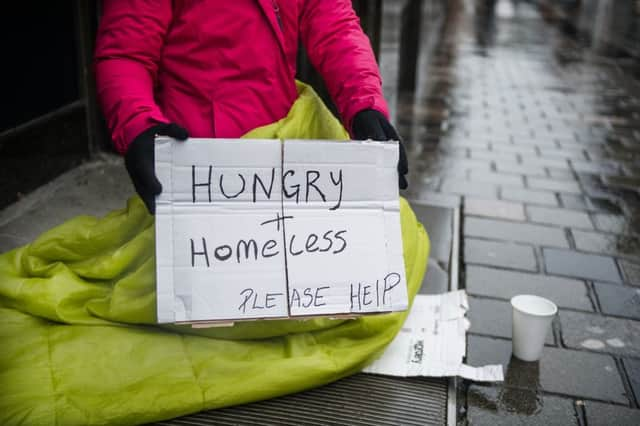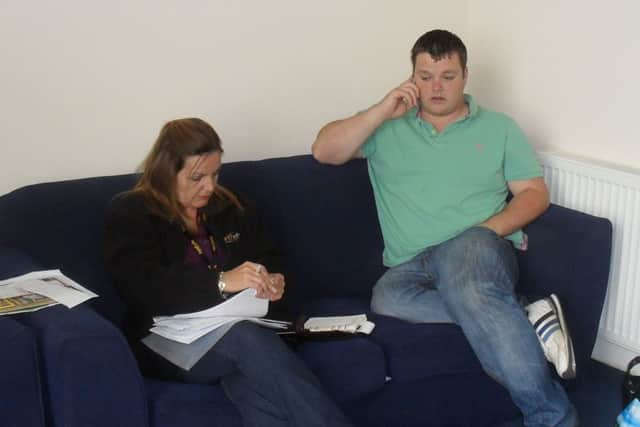Help is at hand for Fife's homeless


But the reality is that most of us are just two pay cheques away from being homeless.
Advertisement
Hide AdAdvertisement
Hide AdThese are the shocking statistics revealed by Frontline Fife, the homelessness service which aims to end homelessness across the region by taking preventative action and assisting people to transform their lives to live independently.


And the charity, which works as part of the Fife Public Social Partnership, a joint venture between Fife Council and 12 service providers including housing associations and charities, says that January is always its busiest month for referrals, with many families cracking under the strain of relationship or financial pressures after Christmas.
Caryn Nicolson, chief executive of Frontline Fife, and her dedicated staff are working hard to help people from all walks of life who, for many reasons – redundancy, relationship breakdown or health problems – face the threat of no longer having a roof over their head.
And she says that the best way to do that is to work on preventative measures wherever possible.
Advertisement
Hide AdAdvertisement
Hide Ad“The idea behind the partnership, which has been going for just over a year, is to pool our resources and co-ordinate the help which is available for people so that our clients’ needs can be managed in more of a single process,” she explained.


“We have people coming to us looking for housing advice, who may be having problems with their landlord and we can help by speaking to them to try to come to some sort of arrangement whereby they won’t become homeless; people looking for support with court advocacy; people who might have a home but who need support to sustain that; people with mental health problems – the list is a long one.
“The group most at risk of becoming homeless are young males between the ages of 18 and 34 and the greatest cause is relationship breakdown.
“Everyone is vulnerable to becoming homeless and one of our key messages is that if you are struggling to cope then help is there, and the earlier the intervention, the more chance there is of a successful outcome.”
Advertisement
Hide AdAdvertisement
Hide AdCaryn says that because there is not yet an accepted social responsibility, many people still feel that there is a stigma related to homelessness and are unwilling to seek help.


“We have people from all walks of life coming to us, from people who have led a very wealthy lifestyle then their job market collapses, to teenagers falling out with their parents and being put out of the house, and we are able to help most people if they want it,” she said.
“Traumatic experiences throughout people’s lives can break down their resilience, and if they keep falling down time after time it can be more difficult to pull themselves back up again, and this can make them more vulnerable to becoming homeless.
“This is where the Public and Social Partnership can be vital to support people to deal with more complex needs.
Advertisement
Hide AdAdvertisement
Hide Ad“It has an exceptional body of workers with skills in many different areas from legally trained professionals to social workers, case workers, health workers and housing specialists who are all there to offer support.”


If people do find themselves without a home, Frontline Fife can offer short-term housing support where people are given accommodation and help to sort out problems they may have and find suitable long-term housing.
They may be given advice on managing money, conflict support, looking after their health and building up support networks to enable them to cope in the long term.
“Our staff have been trained in Asset Based Support – looking at the individual’s skills and ambitions and helping them to work on their strengths to sort out their lives and develop a resilience to deal better with problems when they arise,” she said. “It is not about wrapping them in cotton wool, but building them up to enable them to go forward again.”
Advertisement
Hide AdAdvertisement
Hide AdAnd for people in need of immediate help there is also crisis help available to get them shelter for the night before working out what longer term help is available.
“If there is conflict, we can work with them to try to keep them with their families and if this is not possible then we would work with them in temporary accommodation with a view to getting them into sustainable living with all the support they need to do that,” she added.
“Our focus is on finding resolutions.”
The statistics
Between December 2016 and January 2017, Frontline Fife saw an eight per cent increase in its overall work and a 12 per cent increase in its housing advice work, a trend continuing from previous years.
In the last five years the total number of homeless people in Fife has drastically reduced from 4500 in 2010/11 to almost 2500 in 2015/16.
Advertisement
Hide AdAdvertisement
Hide AdHowever, the number has increased by 212 or nine per cent from 2014/15 to 2015/16, with Fife recording the fourth highest increase in the country.
Case study
Kelly (not her real name) is a single-parent with two children. She had extensive rent arrears in excess of £4,500 and around £10,000 of debt. She also suffers from anxiety and mental health issues.
When referred to Frontline Fife, a decree had been granted and a date for eviction set, with the family at risk of becoming homeless.
Frontline Fife acted to stop the eviction and had the case called back to court.
Advertisement
Hide AdAdvertisement
Hide AdInvestigations revealed that Kelly was not receiving housing benefit as she had previously been a full-time student. As her circumstances had changed, a housing advisor helped her make an application and apply for it to be back-dated. This was successful, clearing half the rent arrears.
Housing benefit was also awarded and a repayment plan put into place towards clearing the remainder of the debt. She was referred for financial advice and is considering sequestration.
The family’s tenancy is now more secure and Kelly is better able to manage the household finances.